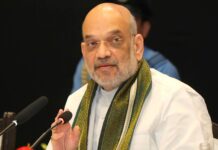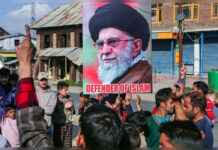X: @the_news_21
The recent release of the Modi government’s White Paper on the Indian economy has ignited a fresh wave of political debate, with key figures from the previous administration, notably Sanjaya Baru, former media advisor to Prime Minister Manmohan Singh, dismissing it as a mere political statement rather than a comprehensive assessment.
Baru, who served as an insider during Manmohan Singh’s tenure, offers a counter-narrative to the White Paper’s critique of the Congress-led UPA government’s economic policies. He emphasizes the significant strides made in terms of economic growth, poverty reduction, and export expansion during that period. Baru contends that while mistakes may have occurred, characterizing Singh’s tenure as a period of crisis and mismanagement is unfounded.
The publication of Baru’s memoir, “The Accidental Prime Minister,” in 2014 provided insights into the dynamics of power within the Singh administration, shedding light on the influence of Congress President Sonia Gandhi. The book sparked controversy, with the PMO officially denouncing it as fiction, yet Baru maintains that his intent was to present an empathetic portrayal of Singh.
The contrasting narratives underscore the inherently political nature of economic assessments, particularly in the context of partisan politics. While the Modi government seeks to leverage the White Paper as a tool to highlight perceived shortcomings of the previous regime, the response from figures like Baru underscores the subjectivity inherent in such evaluations.
Moreover, the timing of the White Paper’s release, amidst a general election campaign already underway in many parts of the country, suggests a strategic move by the BJP to shape the narrative around its economic stewardship and contrast it with the perceived failures of the UPA era. The paper is poised to become a focal point of the BJP’s election messaging, with state units expected to amplify its contents to underscore the government’s efforts to steer the economy back on track.
As India braces for a new phase of political discourse leading up to the elections, the debate surrounding the White Paper serves as a reminder of the intersection between economics and politics, where competing narratives vie for public attention and electoral support. In this contest of ideas, the true impact of economic policies on the lives of citizens often becomes secondary to the battle for political supremacy.








cost clomid without rx get generic clomid prices order clomid without a prescription can you buy cheap clomiphene online how to buy generic clomid pill where to buy clomiphene tablets can i order clomiphene pills
The thoroughness in this draft is noteworthy.
This is a theme which is virtually to my verve… Many thanks! Unerringly where can I notice the contact details an eye to questions?
cost azithromycin – tindamax buy online buy flagyl without prescription
oral semaglutide 14mg – oral semaglutide 14mg buy generic cyproheptadine online
buy motilium generic – flexeril for sale online buy cyclobenzaprine 15mg pill
where can i buy augmentin – https://atbioinfo.com/ acillin sale
order esomeprazole 20mg pill – nexium to us buy nexium 20mg pill
warfarin brand – https://coumamide.com/ order hyzaar pills
buy meloxicam generic – relieve pain buy mobic 7.5mg without prescription
order generic deltasone 10mg – https://apreplson.com/ deltasone 20mg tablet
buy generic ed pills online – ed pills top erection pills
cheap amoxil generic – comba moxi order amoxicillin for sale
cenforce ca – click cenforce 50mg drug
can you drink wine or liquor if you took in tadalafil – cialis instructions cialis 20 mg price walgreens
order zantac 300mg for sale – buy cheap generic zantac zantac tablet
sildalis sildenafil tadalafil – https://strongtadafl.com/ generic cialis available in canada
I couldn’t turn down commenting. Well written! kamagra efectos
how old do you have to be to buy viagra – https://strongvpls.com/ buy viagra hcmc
I couldn’t turn down commenting. Adequately written! order amoxil pills
I couldn’t weather commenting. Well written! https://ursxdol.com/get-cialis-professional/
Thanks on putting this up. It’s well done. prilosec online order
With thanks. Loads of expertise! https://ondactone.com/product/domperidone/
More posts like this would bring about the blogosphere more useful.
avodart generic
This website really has all of the low-down and facts I needed there this participant and didn’t identify who to ask. https://myvisualdatabase.com/forum/profile.php?id=117928
dapagliflozin 10mg for sale – https://janozin.com/ dapagliflozin 10mg uk
buy orlistat generic – click oral orlistat 120mg
Hey there! This post could not be written any better! Reading
this post reminds me of my previous room mate! He always kept talking about this.
I will forward this article to him. Pretty sure he wll hace a
good read. Thanks for sharing! https://Bookofdead34.Wordpress.com/
I couldn’t turn down commenting. Well written! http://www.cs-tygrysek.ugu.pl/member.php?action=profile&uid=98754
More articles like this would frame the blogosphere richer. TerbinaPharmacy
You can keep yourself and your ancestors nearby being wary when buying prescription online. Some pharmacy websites function legally and offer convenience, privacy, cost savings and safeguards to purchasing medicines. http://playbigbassrm.com/fr/
This is a keynote which is virtually to my verve… Numberless thanks! Quite where can I notice the acquaintance details in the course of questions?
iwin – nền tảng game bài đổi thưởng uy tín, nơi bạn có thể thử vận may và tận hưởng nhiều tựa game hấp
采用高效谷歌外推策略,快速提升网站在搜索引擎中的可见性与权重。谷歌外推
专业构建与管理谷歌站群网络,助力品牌实现全域流量的强势增长。谷歌站群
Tham gia cộng đồng game thủ tại Go88 để trải nghiệm các trò chơi bài, poker phổ biến nhất hiện nay.
Tham gia cộng đồng game thủ tại Go88 để trải nghiệm các trò chơi bài, poker phổ biến nhất hiện nay.
iwin – nền tảng game bài đổi thưởng uy tín, nơi bạn có thể thử vận may và tận hưởng nhiều tựa game hấp